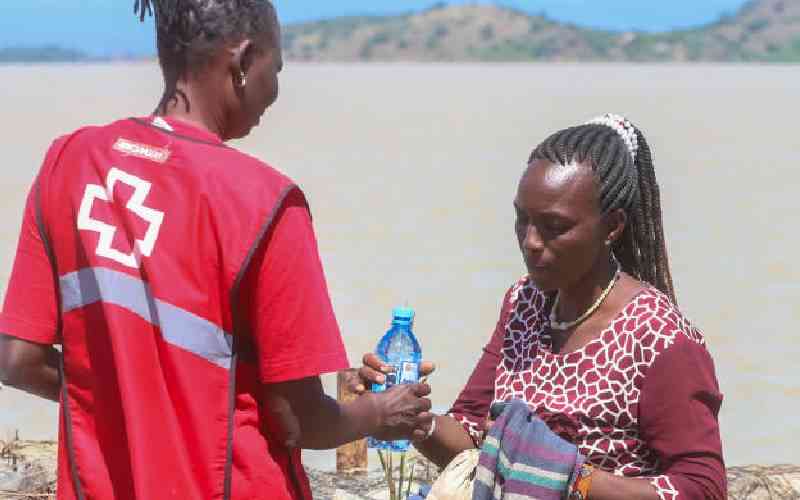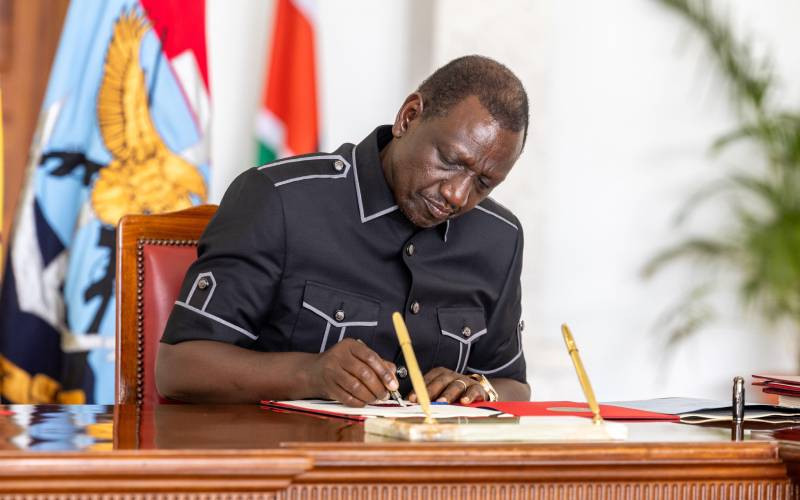 |
|
KDF soldiers give foodstuffs to children near Dhobley military camp on Friday. [PHOTOS: COLLINS KWEYU/STANDARD] |
By JECKONIA OTIENO
Somali: Dhobley town on the Somalia-Kenya border was a stronghold of Al-Shabaab terrorists before they were kicked out by Kenya Defence Forces (KDF) forces under the aegis of the African Union Mission to Somalia (Amisom).
Since KDF and other Amisom forces moved into Somalia over two years ago and threw the militants out of the town, life is slowly returning to normal.
Town residents are upbeat over the prevailing peace. An immigration post has been built at the border and a police camp is also in place to ensure security.
But more important is the acceptance the forces have gained among the locals.
Children happy
As convoys of troops pass the roads towards the Dhobley military camp, children come out waving and hoping to get food. This is contrary to when Al-Shabaab controlled the town and residents were forced to line the streets to cheer the ragtag militia.
The town, now under a District Commissioner, is undergoing gradual rebuilding together with the villages that make up the district
DC Mohammed Abdullahi says Dhobley District has four villages.
The town itself is slightly bigger than Liboi on the Kenyan side.
Abdullahi says that the residents are thankful that they can go about their businesses without fear.
“We are thankful to KDF and Amisom for the work they have done in liberating our people from the clutches of terror. Locals here know too well that if the terror group comes back, then life will be difficult once more and that is something they would not like,” says Abdullahi.
The DC says the nascent administration plans to ensure that there is security for investors in the town.
Police service
However, Dhobley’s security is in the hands of the volunteers due to lack of a working police service or national army.
Stay informed. Subscribe to our newsletter
The DC says there are still challenges that the district is grappling with, especially provision of social services like education, water, sanitation and healthcare. On education, there are no teachers from the government hence most children are taught through the madrassa system or by private school owners who are mainly from Kenya.
The other problem that Dhobley is grappling with is lack of proper healthcare since relief organisations and individuals run most clinics.
“We have no capacity to tackle these problems so we are waiting for regional and central governments to start proper work so that it can set up a proper health system,” says Abdullahi.
But even as these are set to start functioning, the DC is asking for citizens of Jubaland in the diaspora to return and invest so that they can help develop their home country.
“I am also welcoming anyone who wants to invest in Jubaland to feel free to come. The airstrip is already functioning and we expect to start seeing planes with investors. We will ensure that there is security for them,” says the DC.
The women of Dhobley have not been left behind in the drive to rebuild Dhobley. Already there is a women affairs committee.
Hariyo Women Group chair Ardo Ahmed says that it has engaged in creating awareness and sensitisation on issues like polio and economic empowerment.
One of the ways in which the committee is empowering women in Dhobley is by making artifacts, which are sold to customers from Kenya.
The committee says unexploded ordinances around the town are a major problem. But KDF, through its engineers, is doing its best to identify the dangerous areas to mop them up so that there is ease of movement for security forces as well as civilians.
On the business front, Warsame Khasim who owns the largest motor vehicle spare parts outlet in Dhobley says that the greatest fear in the town is the thought of return of war. He says that most business close early due to uncertainty.
“Sometimes we have to close as early as 5pm and we can only open at 8am because of the fear,” says Khasim.
Khasim gets supplies for his outlet mainly from Nairobi and some from Mogadishu. The greatest problem is the poor infrastructure, which delay delivery of goods and services.
The streets are lined up with moneychangers who deal in Kenyan, Somali and US currencies. One of them, Mohammed Abdi, has done this business for five years, right from when Al-Shabaab ruled the town. He says that with improved security, things are looking better for Jubaland.
The livestock market is teeming with camels, sheep, goats and cattle. Ahmed Kassim says that this was not the situation over a year ago due to insecurity.
Kassim says that with time, the town will grow but only if the security does not deteriorate again.
A police station opposite the DC’s office is one of the town’s iconic landmarks but with many guns in civilian hands, it might take long before the station starts discharging its mandate undeterred. Therefore Amisom forces still have a huge mandate to ensure adequate security.
 The Standard Group Plc is a
multi-media organization with investments in media platforms spanning newspaper
print operations, television, radio broadcasting, digital and online services. The
Standard Group is recognized as a leading multi-media house in Kenya with a key
influence in matters of national and international interest.
The Standard Group Plc is a
multi-media organization with investments in media platforms spanning newspaper
print operations, television, radio broadcasting, digital and online services. The
Standard Group is recognized as a leading multi-media house in Kenya with a key
influence in matters of national and international interest.
 The Standard Group Plc is a
multi-media organization with investments in media platforms spanning newspaper
print operations, television, radio broadcasting, digital and online services. The
Standard Group is recognized as a leading multi-media house in Kenya with a key
influence in matters of national and international interest.
The Standard Group Plc is a
multi-media organization with investments in media platforms spanning newspaper
print operations, television, radio broadcasting, digital and online services. The
Standard Group is recognized as a leading multi-media house in Kenya with a key
influence in matters of national and international interest.








